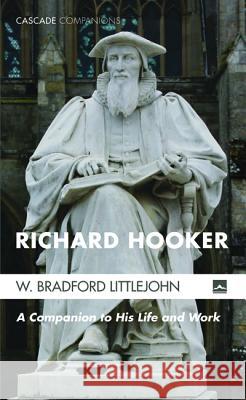Richard Hooker » książka
Richard Hooker
ISBN-13: 9781625647351 / Angielski / Miękka / 2015 / 222 str.
Richard Hooker
ISBN-13: 9781625647351 / Angielski / Miękka / 2015 / 222 str.
(netto: 97,74 VAT: 5%)
Najniższa cena z 30 dni: 101,21
ok. 16-18 dni roboczych.
Darmowa dostawa!
Although by common consent the greatest theologian of the Anglican tradition, Richard Hooker is little known in Protestant circles more generally, and increasingly neglected within the Anglican Communion. Although scholarship on Hooker has witnessed a dramatic renaissance within the last generation, thus far this has tended to make Hooker less, not more accessible to general audiences, and interpreters have been sharply divided on the meaning of his theology. This book aims to draw upon recent research in order to offer a fresh portrait of Hooker in his original historical context, one in which it had not yet occurred to any Englishman to assume the label "Anglican," and to bring him to life for all branches of the contemporary church. Part One examines his life, writings, and reputation, puncturing several old myths along the way. Part Two seeks to establish Hooker's theological and pastoral vision, exploring why he wrote, how he wrote, whom he was seeking to persuade, and whom he was seeking to refute. Part Three analyzes key themes of Hooker's theology--Scripture, Law, Church, and Sacraments--and how they related to his late Reformation context. Finally, the concluding chapter proposes Hooker's method as a model for our confused contemporary age, combining fidelity to Scripture, historical awareness, and a pastorally sensitive pragmatism. "Richard Hooker is a name that many church people have heard of, but few have ever dipped into his works . . . Brad Littlejohn brings to bear an impressive range and depth of scholarship and critical insight to set Hooker in the context of the controversies of his time, and guides us through the maze of contemporary interpretations of Hooker's thought and significance." --Paul Avis, Professor of Theology, University of Leeds "Littlejohn's companion, Richard Hooker, offers a splendidly accessible introduction to the life and work of this eminent but popularly neglected early-modern English theologian and philosopher . . . This volume offers an excellent point of departure for both scholars and non-specialist readers." --Torrance Kirby, Professor of Ecclesiastical History, McGill University "Richard Hooker is the theologian of Anglicanism. But is he a theologian for Anglicans alone? Assuredly not In this companion to Hooker, Littlejohn has produced a clearly written and accessible work that utilizes the recent resurgence of scholarly interest in Hooker to commend him to a wider audience. . . . It is sure to be a resource of choice for those seeking a way into the thought of this great post-Reformation divine." --Oliver D. Crisp, Fuller Theological Seminary W. Bradford Littlejohn (Ph.D, University of Edinburgh, 2013) is President of the Davenant Trust, an organization that supports historical research at the intersection of the church and academy. He also teaches philosophy at Moody Bible Institute. He is the author of several articles and book chapters on Richard Hooker and the Reformation period, and serves as editor of the Mercersburg Theology Study Series.
Although by common consent the greatest theologian of the Anglican tradition, Richard Hooker is little known in Protestant circles more generally, and increasingly neglected within the Anglican Communion. Although scholarship on Hooker has witnessed a dramatic renaissance within the last generation, thus far this has tended to make Hooker less, not more accessible to general audiences, and interpreters have been sharply divided on the meaning of his theology. This book aims to draw upon recent research in order to offer a fresh portrait of Hooker in his original historical context, one in which it had not yet occurred to any Englishman to assume the label "Anglican," and to bring him to life for all branches of the contemporary church. Part One examines his life, writings, and reputation, puncturing several old myths along the way. Part Two seeks to establish Hookers theological and pastoral vision, exploring why he wrote, how he wrote, whom he was seeking to persuade, and whom he was seeking to refute. Part Three analyzes key themes of Hookers theology--Scripture, Law, Church, and Sacraments--and how they related to his late Reformation context. Finally, the concluding chapter proposes Hookers method as a model for our confused contemporary age, combining fidelity to Scripture, historical awareness, and a pastorally sensitive pragmatism."Richard Hooker is a name that many church people have heard of, but few have ever dipped into his works . . . Brad Littlejohn brings to bear an impressive range and depth of scholarship and critical insight to set Hooker in the context of the controversies of his time, and guides us through the maze of contemporary interpretations of Hookers thought and significance."--Paul Avis, Professor of Theology, University of Leeds"Littlejohns companion, Richard Hooker, offers a splendidly accessible introduction to the life and work of this eminent but popularly neglected early-modern English theologian and philosopher . . . This volume offers an excellent point of departure for both scholars and non-specialist readers."--Torrance Kirby, Professor of Ecclesiastical History, McGill University"Richard Hooker is the theologian of Anglicanism. But is he a theologian for Anglicans alone? Assuredly not! In this companion to Hooker, Littlejohn has produced a clearly written and accessible work that utilizes the recent resurgence of scholarly interest in Hooker to commend him to a wider audience. . . . It is sure to be a resource of choice for those seeking a way into the thought of this great post-Reformation divine."--Oliver D. Crisp, Fuller Theological SeminaryW. Bradford Littlejohn (Ph.D, University of Edinburgh, 2013) is President of the Davenant Trust, an organization that supports historical research at the intersection of the church and academy. He also teaches philosophy at Moody Bible Institute. He is the author of several articles and book chapters on Richard Hooker and the Reformation period, and serves as editor of the Mercersburg Theology Study Series.











